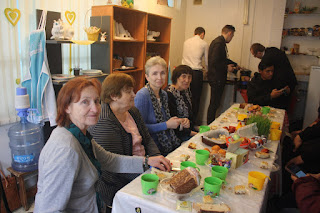From the website of the Lutheran World Federation.
WINDHOEK,
Namibia/GENEVA, 10 May 2017 - The survival of the church through
tribulations is the fulfilment of God’s promise, participants in
the Twelfth Assembly of The Lutheran World Federation (LWF) were
reminded during the opening worship.
“God’s
promises concern life and everyday existence, our daily bread and all
our works, God’s promises open for us a truth that everything makes
sense, all our deeds and even thoughts and feelings have a meaning,
and the ultimate goal is that we, with all our thoughts and deeds,
can be saved.” This was the message from Rev. Dr Elena Bondarenko
of the Evangelical Lutheran Church in European Russia, in her sermon
at the Assembly eucharistic worship.
The
service attended by some 800 people was held in a worship tent
erected on the grounds of the Safari Court Hotels and Conference
Center in Windhoek, where the highest decision-making body of the LWF
is meeting, jointly hosted by the three member churches in Namibia. A
mass choir and musicians from the local churches accompanied the hymn
singing.
Preaching
on Isaiah 61: 1-4, Bondarenko urged the congregation members from
around the world to trust in God. “God’s promises are really
held. For 2,000 years the Christian church has been teaching,
proclaiming the gospel and administering Holy Sacraments. […] The
church is victorious because Jesus promised it.”
The
worship tent, which will be the meeting point for most of the
assembly worship and prayer services, has an altar table, font and
pulpit made of wood from fallen trees collected in Namibia.
The
assembly host churches namely, the Evangelical Lutheran Church in the
Republic of Namibia (ELCRN), Evangelical Lutheran Church in Namibia,
and the Evangelical Lutheran Church in Namibia - German Evangelical
Lutheran Church, bring together some 1.2 million people. They join
hands under the banner of the United Church Council of the Namibia
Evangelical Lutheran Churches, through which they collaborate to
enhance church unity in the country.
God’s
gifts are not for sale
Bondarenko’s
reflections on the Assembly theme, “Liberated by God’s Grace,”
and sub-themes elaborating that salvation, human beings and creation
are “not for sale” also set the tone for the Sunday, 14 May,
global event to commemorate the Reformation anniversary at the Sam
Nujoma Stadium.
She
suggested the sequence: creation-human beings-grace-salvation, to
affirm the order of biblical history, and the most important of God’s
promises. “God’s gifts are not for sale. God gives us freedom and
grace in abundance. God comes to save us in our time. And it is time
to rebuild the ancient ruins and restore the places long devastated,
it is time to worship God according to the tradition, but also with
our own, new song,” she added.
Bringing
meaning to life
A
church dean, who has been involved in reconciliation work with
congregations in the Ukraine amid the Crimean crisis, Bondarenko
noted the 500th Reformation anniversary also coincides with the 100th
anniversary of two Russian revolutions that brought persecution to
Christians there.
She
asked the congregation to imagine what it was like in Russia to live
under official atheism for almost 90 years, “without our faith in
God” and “without the beauty of the Holy Scriptures and church
liturgy [or] God’s guidance and support in the chaos of times.”
Emphasizing
that God’s promises hold, she said, “When everything was done to
make the church silent and dead, it is a real miracle that the Bride
of Christ, the church survived.”
Her
message to Christians today, facing new challenges and questions to
which they might not have many answers: “Let us humbly confess our
ignorance and trust in God our Creator. What is in our power is to be
honest and honestly to proclaim God’s grace and to preach that
creation and salvation are not for sale. This was the basis of the
Reformation 500 years ago, this is the principle that we renew in a
modern way nowadays,” she added.
ELCRN
Bishop Ernst //Gamxamub presided at the Eucharist, which was
distributed at different points in the tent. Other liturgical
parts of the service were led by Bishop Dr G. Raja Socrates
Sathyachandar from the Arcot Lutheran Church in India, and Church of
Norway Presiding Bishop Helga Haugland Byfuglien, who is also LWF
Vice-President for the Nordic region.
After
the service, participants moved from the tent to the conference
center plenary hall to begin the Assembly business sesions, which
today will include the address of the LWF President and presentation
of Messages from the Women and Youth Pre-Assemblies.
 On June 24 the congregation in
Berdyansk (Zaporozhskaya obl., Ukraine) celebrated 20 years since its
re-birth. On this day the celebratory worship service in the Church
of Christ the Savior was led by Pastor Andrey Kuznetsov (Kiev). 10
congregational members were baptised and confirmed. Many warm words
of congratulations and presents were given to the congregation by
guests and friends who were not able to attend in person.
On June 24 the congregation in
Berdyansk (Zaporozhskaya obl., Ukraine) celebrated 20 years since its
re-birth. On this day the celebratory worship service in the Church
of Christ the Savior was led by Pastor Andrey Kuznetsov (Kiev). 10
congregational members were baptised and confirmed. Many warm words
of congratulations and presents were given to the congregation by
guests and friends who were not able to attend in person.

















































